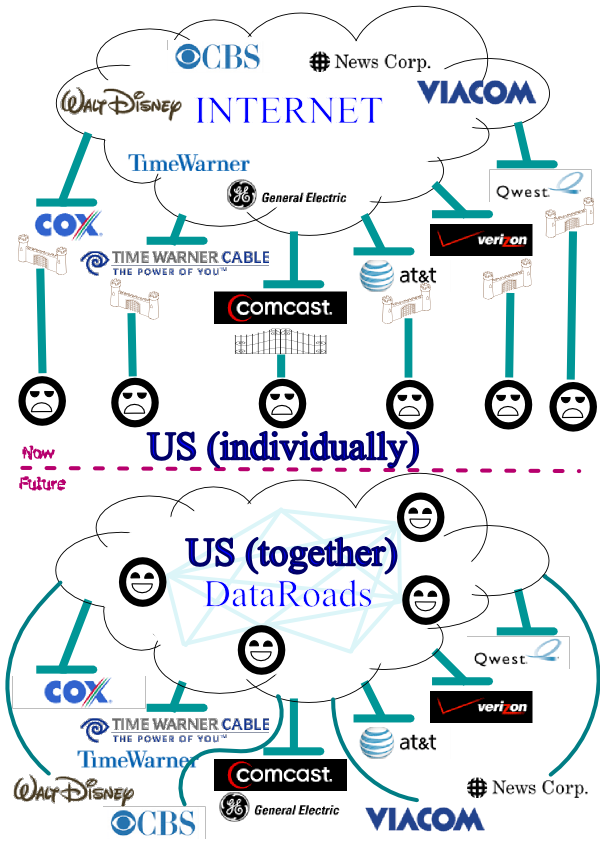From Community Broadband Networks, and the Institute for Local Self Reliance:

Continue reading “The imbalance toward profiteer networks”
DIDO Disappointment
http://www.theregister.co.uk/2011/08/01/dido_snake
The Rearden Labs whitepaper on “Distributed Input Distributed Output” (DIDO) wireless technology has disappointed me in many ways.
1. First, it didn’t really talk about the technology used.
The Future of Wireless Internet
These articles are all related:
Radio frequency is just light outside of human visible range. Light does not interfere.
Why I started DataRoads.Org, and ThePoint.com Challenge.
Why I started DataRoads.Org
As with most truly new endeavors, this one took a path that no one could predict or intend. I really thought there would already be something like this out there, somewhere. I was surprised the DataRoads.Org domain name was even available. Even after setting up this web site, I thought all that we would have to do is promote existing network standards for deployment by land and home owners, making the Data Roads Foundation more like an Auto Club and less like a civil engineering firm.
In fact, I thought I already knew of a couple Data Roads routing software candidates, via my research for the NELA-ISC.Net project. The main projects I had in mind were CUWiN and PERM, both wireless mesh projects of the University of Illinois at Urbana-Champaign. Unfortunately, most of the updates and action on these projects seem to have ended in 2008, due to students graduating, and Ph.D. candidates finishing their theses. They are two great open source projects to work from, but thorough research made it obvious that I would be fairly alone in updating them to the latest hardware. It also seemed like these projects were limited to small communities in scope, because of the use of IPv4 addressing. ICANN is running out of IPv4 numbers this year, because they are insufficient for seamless global routing compared to IPv6.
Continue reading “Why I started DataRoads.Org, and ThePoint.com Challenge.”
The “One True” Fallacy
Although “The ‘One True’ Fallacy” may eventually qualify for a list of logical fallacies, I don’t have the Ph.D. nor time required to present all the reasoning behind adding it. I really just want to talk about data files.
Power over DataRoads: Energy competition through microgrids.
Recent developments in small renewable power sources (like solar and small wind), as well as infrastructure destruction during recent tragedies (like Hurricane Katrina), have led some brilliant minds to rethinking the way we distribute and manufacture electrical power. Many of these studies all lead to the same conclusion: data networks allow us to carry enough information about diverse power sources and uses, so that they can be efficiently coordinated at small scale, over a simple grid of neighbor-to-neighbor transmission lines. These small power grids are generally called microgrids. These “smart power” grid networks function at fairly low data bandwidth, so smart grids can be built on top of (or to extend) normal network data lines.
Continue reading “Power over DataRoads: Energy competition through microgrids.”
Flipping the Internet upside-down, visually.
I’ve rarely been accused of being too terse, or not technical enough. In the interest of brevity and clarity, I have created a visual representation of how it looks to flip the Internet upside-down, as suggested solely via text in an earlier post.
Continue reading “Flipping the Internet upside-down, visually.”
Connection Rights and a First-Sale Doctrine for Broadband
These legislative propositions came to me as ideas that would ease Data Road equipment deployment in the future, but I think they could have a good (but more subtle) effect on their own, and with Network Neutrality legislation in general. Let me know if you agree.
Continue reading “Connection Rights and a First-Sale Doctrine for Broadband”
When global agreements aren’t necessary.
I want to eliminate the need for ICANN — the group that decides all the Internet names! Did that get your attention? That’s good, but please note that I would like to have ICANN around for a very long time. The operative word in that first sentence is ‘need.’ I want to eliminate the need for ICANN, in the same way I want to eliminate the need for any world atlas when I’m only travelling just a few blocks away. While an atlas may be detailed enough to be useful for such a short trip, it’s definitely more cumbersome than necessary. I don’t even need to know the name of the city I’m in, if I’m only travelling along 1 street, just 2 blocks to the south. I could change city borders during that trip, and I wouldn’t need to realize it, unless there happened to be a wall at the city border line. In that strange case, the wall should have a plaque or guard that tells me about the city border. I don’t need the atlas if I can just read the plaque when I get there.
Collective network ownership, a check on power mongers.
I read the news too often. I say that because it’s too often depressing, which is not healthy for me. The prime example I have at the moment is this news from various sites, best summarized at BroadbandReports.com: the government is outsourcing Fourth Amendment violations to private industry. Some of the facts discussed here were not new to me, such as the old partnership between NSA and AT&T, as revealed by a courageous whistle-blower in San Francisco, Mark Klein. Inquiries over projects related to the NSA codename ECHELON have been public since 2000. Our defenders at the Electronic Frontier Foundation (EFF) and American Civil Liberties Union (ACLU) are still fighting for our rights to privacy from these corporate-government collaborative invasions.
Continue reading “Collective network ownership, a check on power mongers.”
